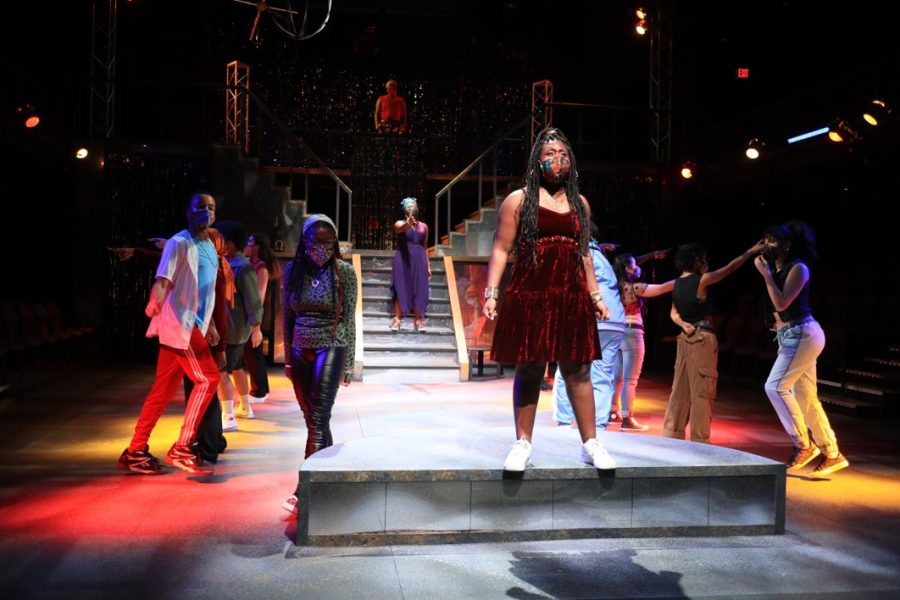Olympus Fuses Greek Myth with Afro-Centered Histories
In College fourth-year Cyril Amanfo’s original musical Olympus, young people of color grapple with immortality and claim their power.
College fourth-year Cyril Amanfo’s original musical Olympus premiered at the Irene and Alan Wurtzel Theater this Thursday. The plot takes place in a world that exists outside of white supremacy and aims to center Black joy and expression. Amanfo, who studies neuroscience and theater, originally conceived of the idea while feeling overwhelmed by news stories centering on Black trauma in recent years.
“Olympus is creating this world where Black people are immortal, not under the gaze of white supremacy,” Amanfo said. “The cast is entirely people of color. The biggest theme for me is that we are here, and we exist. Olympus is a celebration. Not all Black art is Black trauma.”
Caroline Jackson-Smith, professor of Africana Studies and chair of Theater at the College, serves as the director of Olympus. She echoed Amanfo’s belief in centering Black stories in an uplifting way.
“Cyril and I both felt strongly that healing is important, Black joy is important, and the notion of communi- ties and how they negotiate conflict and come together is important,” Jackson-Smith samid. “Ultimately, Cyril’s goal for this piece is to provide joy for the community.”
Olympus follows the story of young Black immortals navigating their power in a mythological world inspired by concepts from Greek mythology. The plot is multi-layered with its main strand focusing on the power struggle between the brothers Hephaestus and Ares, sons of Zeus.
“The story is about how these characters grapple with this change in power, and what it means to step into their own power and their glory, and to find the power within themselves,” Amanfo said.
As a whole, Olympus is nothing short of remarkable. The entire cast and crew prove this through compel- ling acting, powerful vocals, infectious music, strong creative direction, and captivating set design. Most impressive is Amanfo’s own detailed work on the show. As the writer, he presents an original, creative take on Greek mythology by weaving themes of family and hierarchy into the script and lyrics. As an actor, he lights up the stage by taking on the character of Apollo, the god of music. He also serves as the show’s choreographer, with each of his dances more enthralling than the last.
“Cyril is enormously creative, entrepreneurial, and visionary,” Jackson-Smith said. “I’ve been reading Olympus and seeing its workshops for the past two years and have been excited by how Greek mythologies can be transitioned into Afro-centered histories and cultural practices. The idea of younger people of color negotiating some of the kinds of conflict that is part of Greek mythology is really enlightening.”
Family, Amanfo said, is at the heart of the show.
“I wanted to create space for actors of color,” Amanfo said. “I wanted to make them feel welcome, seen, and give them a family. The real show is the people on that stage and this family that we’ve created.”
Caris Gross, a College third-year who is part of the show’s ensemble, is excited about participating in a show that amplifies Black students and students of color on campus.
“While Oberlin and its Theater department are progressive in many ways, I’ve been disappointed by the slow route to supporting and amplifying students of color, and Olympus is a massive celebration of us and our abilities,” Gross wrote in an email to the Review. “As a multiracial (half-Indian and half-white) student and artist, this production has allowed me to embrace my identities fully without feeling any need to erase a part of myself, and to feel 100 percent comfortable in our rehearsal room. It’s also beautiful to see the cast come together as a family in the face of many obstacles and support one another no matter what.”
College third-year Fafa Nutor plays the character of Aphrodite and relished the opportunity to re-envision Ancient Greek myths.
“To play a character who does not have to exist in a world where anti-Blackness reigns is so freeing,” Nutor said. “It makes me imagine a world in which Black young people can grow up without that weight.”
The music, written by Amanfo, Max Addae, OC ’21, and double-degree fifth-year Mark Ligonde, is far from typical Broadway show tunes. The show’s soundtracks are infused with elements of gospel, hip-hop, rap, R&B, and Afrobeat.
“Olympus is all types of music from the Black experiences,” Amanfo said. “It’s creating music from our own lived experiences. I didn’t want to give basic show tunes because I don’t relate to that — that’s not me. Mark, Max, and I infused ourselves in this world to make music.”
Amanfo is not new to creating musicals. In his second year he wrote, directed, choreographed, and starred in his original work Equilibrium through Oberlin Student Theater Association. Olympus, though, finds itself in a faculty-directed time slot because of its visionary con- cept and the immense dedication it received from the cast and crew.
“We don’t usually have students work in the faculty-directed slot, but we really have not ever seen a group of students who have put this much time into developing a work,” Jackson-Smith said. “This work has a vast vision. I think the department really wanted to honor Cyril’s vision of work and it seemed bringing it into the bigger theater was the best thing to do.”
Amanfo says he’s very proud of the work and the stage the musical is at right now, but he’s also eager to take it to the next level.
“I am absolutely thrilled with what we have right now; however, I’m hungry,” Amanfo said. “I have a goal and a dream, and that is to get this show on Broadway. Not because of the Broadway check, not because of the publicity, but because I want to tell this story to as many people as I possibly can.”







